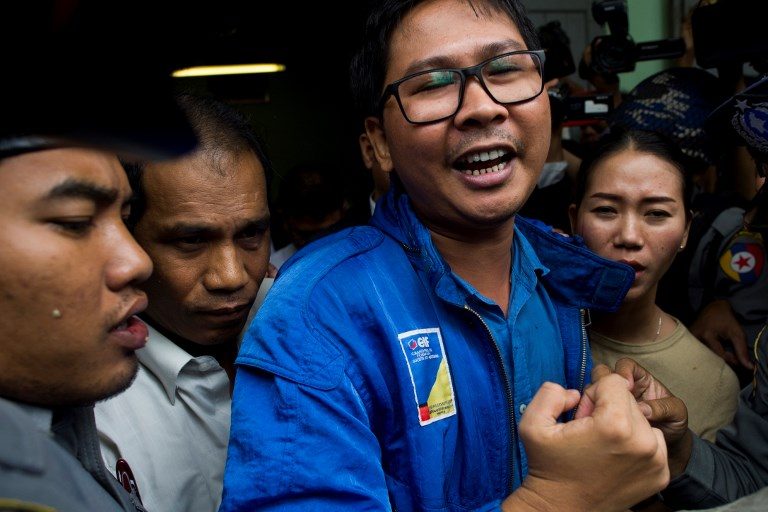SUMMARY
This is AI generated summarization, which may have errors. For context, always refer to the full article.

YANGON, Myanmar (UPDATED) – Two Reuters journalists were formally charged by police in a Myanmar court Wednesday, January 10, with breaching a colonial-era secrecy law that carries up to 14 years in jail, despite calls for their immediate release.
Myanmar nationals Wa Lone, 31, and Kyaw Soe Oo, 27, were arrested a month ago under the Official Secrets Act after they were allegedly given classified documents by two policemen over dinner.
The pair had been reporting on the military campaign in the northern state of Rakhine that has forced some 655,000 Rohingya Muslims to flee over the border to Bangladesh since August.
The UN and US have condemned the violence as ethnic cleansing.
The issue is incendiary inside Myanmar, where authorities deny wrongdoing and say the army was cracking down on militants from the Muslim minority.
A district judge said police charged the pair under a section of the Official Secrets Act which punishes anyone who “obtains, collects, records or publishes… any official document or information” which could be “useful to an enemy”.
The pair will return to court on January 23 for legal arguments, when the bench will decide whether to accept the case under Myanmar’s arcane legal system.
There were emotional scenes in the Yangon courthouse, with family members in tears and the reporters making desperate pleas before being led back into detention.
“Please tell the people to protect our journalists!” Kyaw Soe Oo shouted to the court.
His colleague Wa Lone said his wife was pregnant adding: “I’m trying to be strong.”
Their families have suggested the pair were set up, saying the arrests took place immediately after leaving the restaurant where they dined with the two policemen. The officers are also under arrest but did not appear in court on Wednesday.
The case against the Reuters journalists has shocked Myanmar’s embattled press corps.
Reporters covering Wednesday’s proceedings wore black in protest against their arrest and carried banners proclaiming “Journalism is not a crime”.
Defence lawyer Khin Maung Zaw told Agence France-Presse that an application for bail had been rejected.
Reuters said they were “extremely disappointed” that the authorities were seeking to prosecute.
“We view this as a wholly unwarranted, blatant attack on press freedom,” said Reuters Editor-in-Chief Stephen J. Adler.
“We believe time is of the essence and we continue to call for Wa Lone and Kyaw Soe Oo’s prompt release.”
‘Travesty of justice’
Rights groups condemned their continued detention.
“These charges are a travesty of justice and should be dropped, and these two men should be released immediately and unconditionally,” said Phil Robertson, deputy Asia director of Human Rights Watch, echoing statements by Amnesty International and Fortify Rights.
The US and EU have led global calls for the journalists to be freed while former US president Bill Clinton also weighed in on the issue this week.
“A free press is critical to a free society—the detention of journalists anywhere is unacceptable,” he tweeted on Monday, January 8.
“The Reuters journalists being held in Myanmar should be released immediately.”
The case has cast a spotlight on Myanmar’s troubled transition to democracy after nearly five decades of military rule.
It touches both on shrinking press freedom and the Rohingya crisis, two issues that have raised questions about the country’s ability to shake off the legacy of junta rule.
Much of the Buddhist-majority population supports the army in what it calls a justified campaign against Rohingya militants, after their attacks on border guard police killed about a dozen people last August.
The military has severely restricted access to Rakhine to reporters, aid groups and observers.
Several legal cases against journalists have disappointed those hoping the civilian government of Aung San Suu Kyi would usher in a new era of freedom.
Her administration shares power with an army that still controls all security policy and other key levers of government.
Suu Kyi’s time in office has also been dominated by the Rohingya crisis, with criticism from around the globe of her refusal to denounce the army’s crackdown and allow in international investigators. – Rappler.com
Add a comment
How does this make you feel?
There are no comments yet. Add your comment to start the conversation.